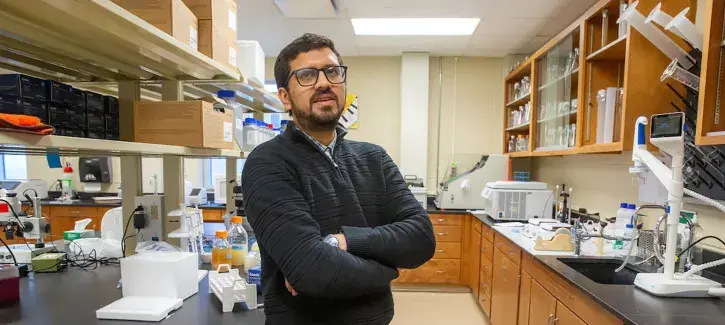
Creighton professor receives $410k grant to combat human-parasitic infections

“Worms have always interested me,” says Sudhanva Kashyap, PhD, assistant professor in the Creighton School of Medicine Department of Microbiology and Immunology. He calls worms “simple but complex creatures,” simple in their physiology but complex in their incredible ability to adapt and mutate.
Soil-transmitted helminth (STH) parasites, such as roundworms, whipworms and hookworms, affect the health of over a billion people in developing countries in South and Southeast Asia, Africa and South and Central America and are most common in children between the ages of three and eight. Currently, “there is little we can do to kill them,” Kashyap says.
While not fatal, human-parasitic infections nonetheless make life miserable for those afflicted. Symptoms range from intestinal problems to skin rashes. Children infected with STH show physical and cognitive growth retardation resulting in social exclusion.
The National Institutes of Health (NIH) and the National Institute of Allergy and Infectious Disease (NIAID) have awarded Kashyap an R21 grant that provides support for the early and conceptual stages of research and thus encourage exploratory or developmental research. Kashyap is exploring effective ways to combat human-parasitic infections caused by worms.
Not only are parasitic nematode infections an increasing problem, but there is a lack of drug therapy to combat them. In fact, the medications administered to date are veterinary drugs that have been adapted to human use, such as nicotinic anti-parasitic drugs (anthelmintics) like levamisole and pyrantel, which paralyze the worms by activating the nicotinic acetylcholine ion channels on their muscle.
However, parasites recover from exposure to nicotinic anthelmintics through mechanisms that are not well understood. “Our study will provide insight into the molecular mechanisms of nicotinic anthelmintic recovery using a parasitic worm model, Brugia malayi, and clarify how macrocyclic lactones, like ivermectin, can prevent this recovery using rational drug combinations,” Kashyap says.
Lack of anthelmintic drugs, as well as their misuse and overuse, means the diseases the parasites cause can never be fully cured because the adult worms remain viable, building up drug resistance and adapting in ways that diminish the efficacy of the treatment.
The short-term goal of his research into the causes of what he calls “neglected tropical diseases” is to determine what controls parasitic recovery from drug-induced paralysis and then block it to improve drug therapy effectiveness. Long term, Kashyap wants to change “neglected” to “eliminated.”
“It is unfortunate that a group of diseases that affect over a billion people are still ‘neglected,” says Kashyap.




